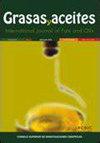The influence of microwave roasting on bioactive components and chemical parameters of cold pressed fig seed oil
IF 1.1
4区 农林科学
Q4 CHEMISTRY, APPLIED
引用次数: 1
Abstract
The effect of microwave roasting process on the compositional parameters and bioactive contents of fig seed oil were investigated. Fig seeds were ground and roasted in a microwave oven at 350, 460 and 600 Watt for 5 and 10 minutes and the roasted seeds were processed to obtain oil. The results showed that peroxide, K232 and K270 values were adversely affected by roasting. Fig seed oil was a prosperous source of γ-tocopherol and significant losses were observed due to microwave pre-treatment. The major fatty acids in fig seed oil were linolenic, linoleic and oleic acids; whereas the major triacylglycerols were LnLO, LnLnL, LnLnLn and LnLnO, according to fatty acid profile. The most abundant sterol in the fig seed oil samples was β-sitosterol with 3235.90 to 3625.62 mg/kg, followed by Δ5- and Δ7-avenasterols. The principal component analysis and agglomerative hierarchial clustering served to differentiate between intense and mild microwave-treated oils as well as the unroasted samples.微波焙烧对冷榨无花果籽油生物活性成分及化学参数的影响
研究了微波焙烧工艺对无花果籽油组成参数和生物活性含量的影响。将无花果种子研磨并在350、460和600瓦的微波炉中烘烤5分钟和10分钟,并对烘烤的种子进行处理以获得油。结果表明,焙烧对过氧化物、K232和K270值有不利影响。无花果籽油是γ-生育酚的丰富来源,由于微波预处理,观察到显著的损失。无花果籽油中的主要脂肪酸为亚麻酸、亚油酸和油酸;而根据脂肪酸谱,主要的三酰基甘油是LnLO、LnLn、LnLnL和LnLnO。无花果籽油样品中甾醇含量最高的是β-谷甾醇,含量为3235.90至3625.62 mg/kg,其次是Δ5-和Δ7-燕麦甾醇。主成分分析和凝聚层次聚类有助于区分强烈和温和微波处理的油以及未烘焙的样品。
本文章由计算机程序翻译,如有差异,请以英文原文为准。
求助全文
约1分钟内获得全文
求助全文
来源期刊

Grasas y Aceites
工程技术-食品科技
CiteScore
2.50
自引率
0.00%
发文量
50
审稿时长
3 months
期刊介绍:
Grasas y Aceites is a peer-reviewed journal devoted to the publication of original articles concerning the broad field of lipids, especially edible fats and oils from different origins, including non acyl lipids from microbial origin relevant to the food industry. It publishes full research articles, research notes, reviews as well as information on references, patents, and books.
Grasas y Aceites publishes original articles on basic or practical research, as well as review articles on lipid related topics in food science and technology, biology, (bio)chemistry, medical science, nutrition, (bio)technology, processing and engineering. Topics at the interface of basic research and applications are encouraged. Manuscripts related to by-products from the oil industry and the handling and treatment of the wastewaters are also welcomed.
Topics of special interest to Grasas y Aceites are:
-Lipid analysis, including sensory analysis
-Oleochemistry, including lipase modified lipids
-Biochemistry and molecular biology of lipids, including genetically modified oil crops and micro-organisms
-Lipids in health and disease, including functional foods and clinical studies
-Technical aspects of oil extraction and refining
-Processing and storage of oleaginous fruit, especially olive pickling
-Agricultural practices in oil crops, when affecting oil yield or quality
 求助内容:
求助内容: 应助结果提醒方式:
应助结果提醒方式:


